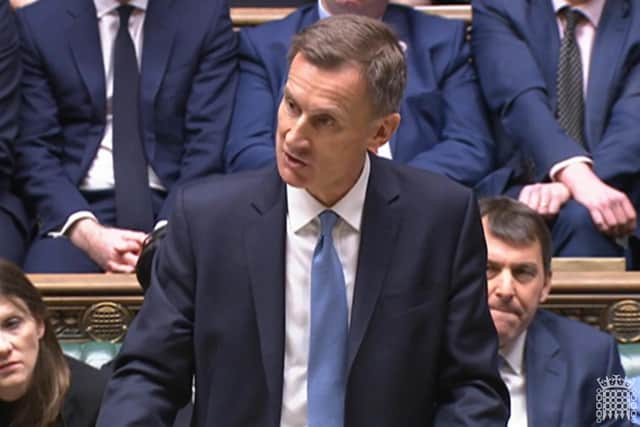Budget: UK economy is 'on the right track' and will not enter technical recession, says Chancellor Jeremy Hunt
and live on Freeview channel 276
Jeremy Hunt told the Commons: “In the face of enormous challenges I report today on a British economy which is proving the doubters wrong.
“In the autumn we took difficult decisions to deliver stability and sound money. Since mid-October, 10-year gilt rates have fallen, debt servicing costs are down, mortgage rates are lower and inflation has peaked.
Advertisement
Hide AdAdvertisement
Hide Ad“The International Monetary Fund says our approach means the UK economy is on the right track.”


UK ‘will not now enter a technical recession’
The UK will not enter a “technical recession” this year, Jeremy Hunt told the Commons.
The Chancellor said: “We remain vigilant, and will not hesitate to take whatever steps are necessary for economic stability. Today the Office for Budget Responsibility forecast that because of changing international factors and the measures I take, the UK will not now enter a technical recession this year.
“They forecast we will meet the Prime Minister’s priorities to halve inflation, reduce debt and get the economy growing. We are following the plan and the plan is working. But that’s not all we’ve done.”
Growth plans
Advertisement
Hide AdAdvertisement
Hide AdThe Chancellor summarised his plans to deliver a growth for the UK economy.
Jeremy Hunt said: “I deliver that today by removing obstacles that stop businesses investing; by tackling labour shortages that stop them recruiting; by breaking down barriers that stop people working; and by harnessing British ingenuity to make us a science and technology superpower.”
Inflation
The Chancellor set out forecasts from the OBR which show inflation will fall.
Jeremy Hunt said: “Inflation destroys the value of hard-earned pay, deters investment and foments industrial strife. This Government remains steadfast in its support for the independent Monetary Policy Committee at the Bank of England as it takes action to return inflation to the 2% target.
Advertisement
Hide AdAdvertisement
Hide Ad“Despite continuing global instability, the OBR report today that inflation in the UK will fall from 10.7% in the final quarter of last year to 2.9% by the end of 2023.”
Draught reflief
The Chancellor also announced increased draught relief for pubs.
Mr Hunt said: “Today, I will do something that was not possible when we were in the EU and significantly increase the generosity of Draught Relief, so that from 1 August the duty on draught products in pubs will be up to 11p lower than the duty in supermarkets, a differential we will maintain as part of a new Brexit pubs guarantee.
“British ale may be warm, but the duty on a pint is frozen.”
Advertisement
Hide AdAdvertisement
Hide AdMr Hunt said the change will apply to “every pub in Northern Ireland” due to the Windsor Framework.
Fuel duty
On fuel duty, Jeremy Hunt said: “Because inflation remains high, I have decided now is not the right time to uprate fuel duty with inflation or increase the duty.
“So here’s what I am going to do: for a further 12 months I’m going to maintain the 5p cut and I’m going to freeze fuel duty too. That saves the average driver £100 next year and around £200 since the 5p cut was introduced.”
The Chancellor added the Government would “uprate tobacco duty, and we will freeze the gross gaming duty yield bands”.
Advertisement
Hide AdAdvertisement
Hide AdHe told the Commons: “Taken together today’s measures lead to a slightly lower overall tax burden for the rest of the Parliament compared to the OBR’s Autumn forecast. Other parties run out of money, but a Conservative government is reducing borrowing and improving our public finances.
“By doing so we make sure we are on track to… … halve inflation … get debt falling …and grow our economy, which I turn to next.”
Debt priority
The Chancellor said: “I now turn to the Prime Minister’s second priority, which is to reduce debt. Here too our plan is on track. Underlying debt is forecast to be 92.4% of GDP next year, 93.7% in 2024-25; 94.6% in 2025-26, and 94.8% in 2026-27, before falling to 94.6% in 2027-28.
“We are meeting the debt priority.”
Economic forecast
Jeremy Hunt laid out the economic forecast for the next five years, claiming the UK would not now enter a recession.
Advertisement
Hide AdAdvertisement
Hide AdHe said: “Let’s turn now to what the OBR say about our growth prospects. In November, they expected that the UK economy would enter recession in 2022 and contract by 1.4% in 2023. That left many families feeling concerned about the future.
“But today, the OBR forecast we will not enter a recession at all this year with a contraction of just 0.2%. And after this year the UK economy will grow in every single year of the forecast period: by 1.8% in 2024; 2.5% in 2025; 2.1% in 2026; and 1.9% in 2027.”
Defence budget
The Chancellor also confirmed the Government would add £11bn to the defence budget over the next five years.
Jeremy Hunt said: “Today, following representations from our persuasive Defence Secretary, I confirm that we will add a total of £11bn to our defence budget over the next five years and it will be nearly 2.25% of GDP by 2025.
Advertisement
Hide AdAdvertisement
Hide Ad“We were the first large European country to commit to 2% of GDP for defence and will raise that to 2.5% as soon as fiscal and economic circumstances allow.”
‘12 potential Canary Wharfs’
The Chancellor said the Government would deliver 12 new investment zones, which he labelled “12 potential Canary Wharfs”.
He said: “In England we have identified the following areas as having the potential to host one: West Midlands, Greater Manchester, the North East, South Yorkshire, West Yorkshire, East Midlands, Teesside and, once again, Liverpool.
“There will also be at least one in each of Scotland, Wales and Northern Ireland.”
More to follow